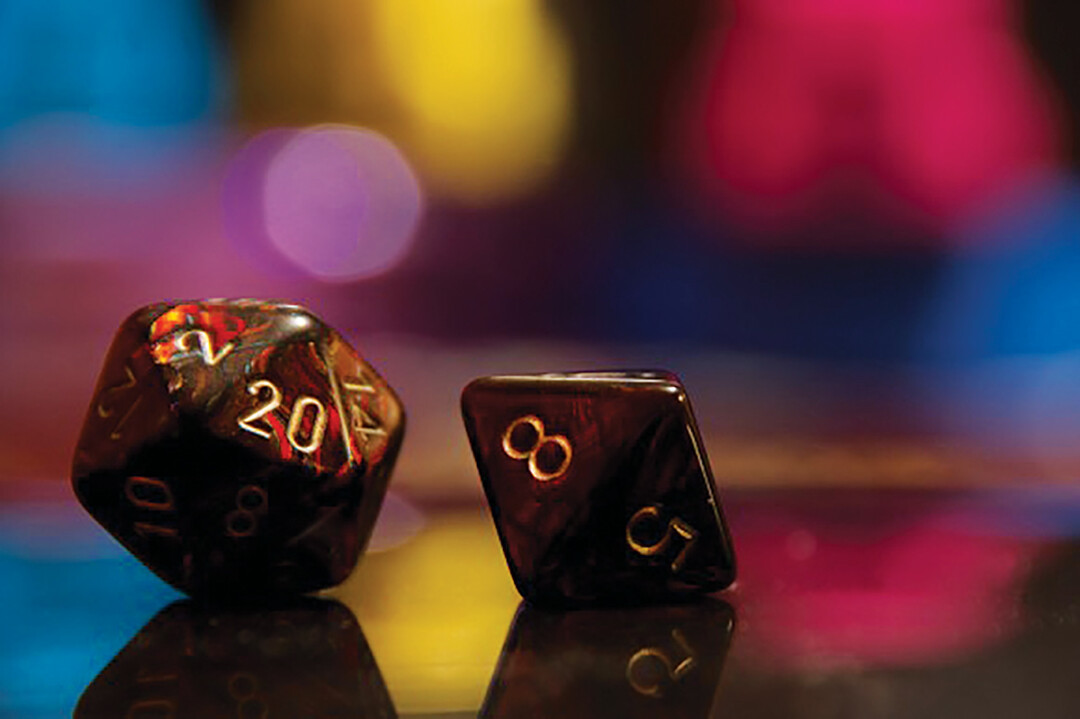Dungeons & Dragons: 7 Reasons to Roll
there's tons of value in the legendary role-playing game

That sound you hear might be the sound of a handful of plastic dice hitting the table in your basement. The fantasy role-playing game Dungeons & Dragons has enjoyed something of a renaissance during the past several years. The game has been heavily referenced on the hit Netflix series Stranger Things and casually discussed on late night TV between personalities like Anderson Cooper and Stephen Colbert. The most successful crowd-funded TV show, at $11 million, is based on a weekly D&D webshow played by a group of voice actors (Critical Role). 2019 marks the 45th anniversary of a game that has strong midwestern roots having been invented by Midwesterners Gary Gygax and Dave Arneson in Lake Geneva, Wisconsin.
For a lot of people, D&D isn't just a hobby, but a foundational element of friendships, a creative outlet, an escape, and much more.
But if the phrase “fantasy role-playing game” seems a little foreign, then allow me to break it down. Dungeons & Dragons is a game where a group of people create and play characters, each of which has set of specialized skills that make them different, that work together as a team to overcome challenges set forth by the Dungeon Master (equal parts storyteller and rules referee) in a fantasy world. A gaming group regularly meets for a handful of hours at a time to play through these scenarios in a story that spans several weeks, months, and sometimes years. A game of Dungeons & Dragons includes storytelling, puzzle solving, action adventure, dice gaming, improvisation, and acting.
For a lot of people, D&D isn’t just a hobby, but a foundational element of friendships, a creative outlet, an escape, and much more. Rather than getting into the nitty-gritty of the game, here are seven reasons why picking up some dice and finding a D&D gaming group is great for anyone.
1. Get Creative
At its core, D&D is a game fueled by creativity. No two games will ever be the same, because every group of players will imagine a different character and adventure in a different way. The game exists in a special, shared imagination space between the players and the Dungeon Master. For Dungeon Masters in particular, the books are only a starting point. The fantasy worlds of D&D are imagined and brought into existence through words alone.
2. Get Social
While geek-related activities often get a bad rap for being “antisocial” this couldn’t be further than the truth for D&D. The game can only be played with others. For some, that group might be a weekly group of changing members at one of the Chippewa Valley’s fine gaming shops. For others like myself, it’s a group forged from friends. A gaming group of friends only gets closer as they explore the world D&D together and face challenges as a team. Friends that you only see once every month or once or twice a year can turn into the kinds of friends you see on a weekly basis. For those that attend groups at a local game shop, the shared language of the game dispenses with the formalities and awkwardness that can plague anyone of any age from making new friends.
3. Improvise
D&D is a game with rules, but it’s not at all like playing through a novel or a video game; the world responds to the actions of the players. The game challenges its players to come up with interesting solutions to problems. Unshackled by real-world consequences, players can try anything from the reasonable to the outlandish to solve a problem. Often the most courageous (read: off-the-wall) solutions are the most memorable.

4. Insight
An oft over-looked benefit of D&D is the opportunity to live vicariously through daring fantasy heroes, but also to look inward at those same characters. The game world not only allows players to create elves and dwarves, or wizards and rogues, but also to play as a character completely different from themselves. In a world powered by imagination, aspects that some of us take for granted like religion, gender, and sexual orientation can be chosen at will. This freedom offers players the ability explore aspects of their own personality they may have never explored real life.
5. Skills
A D&D game challenges the players to use several skills that are useful in daily life. Team building, creative problem solving, quick thinking, listening, and empathy are all important to the game. These skills alone are a great reason for people of all ages to grab some dice. Younger players will learn a lot from the game’s challenges, and adults can brush up talents important in their social lives and careers.
6. Make Memories
Ask anyone who plays D&D what the most memorable moment in their game is and you’d better grab a chair. A gaming group’s sessions are chock full of tales of harrowing adventure, that will commonly be recounted over a few drinks like old war stories. The true magic is that players will almost always remember their adventures as though they, not an imaginary character, lived (or didn’t live) to tell the tale. Through the power of the game, these stories can be a vivid shared memory between friends.
7. Have Fun!
Most importantly, D&D is just fun! It can be challenging to learn the game if you don’t have someone to help show you the ropes, but once you get the hang of it and take advantage of the experiences it has to offer, it’s hard to put down. I discovered the game in 2008 and I’ve been playing in different groups ever since. It’s strengthened my friendships, helped me connect to other people, let me flex creative muscles, and more.






















